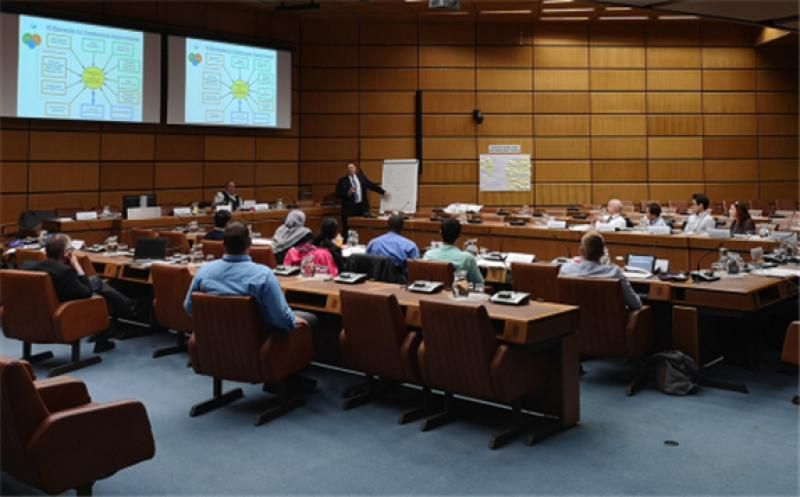Over 60 participants from more than 30 countries learned about the critical importance of using industry operating experience and implementing an effective integrated performance improvement programme at nuclear power plants during an IAEA training course. Enhancing operational safety requires operating organizations to proactively identify opportunities for improvement, closing gaps between existing levels of performance and the IAEA Safety Standards and industry best practices. The safety of a nuclear power plant is dependent on effective leadership, management and sound policies, procedures and practices, as well as on comprehensive instructions, adequate resources and the capability and reliability of personnel.

“The root cause of nuclear incidents is typically associated with deficiencies in the implementation of performance improvement programmes or inadequate use of operating experience,” said Greg Rzentkowski, Director of the IAEA Division of Nuclear Installation Safety. It has to be realized, he added, that it is not the technology that fails, but rather the human element that guides it. Therefore, it is of vital importance, for utilities and regulatory bodies, to foster a culture of continuous improvement as an integral part of their business culture.
“The Agency’s ability to support sustained high operational safety is central to our mandate,” said Dian Zahradka, a Senior Nuclear Safety Officer at the IAEA. “The purpose of this training was to promote the application of relevant IAEA Safety Standards and peer review services to help Member States compare their programmes with the standards of excellence related to effective integrated performance improvement programmes. It also highlighted the importance of leadership commitment and behaviours to successfully drive performance improvement programmes.”
The two-week online training course was held from 2 to 11 February, and participants received information about the performance improvement) elements at nuclear power plants evaluated by the IAEA Peer Review of Operational Safety Performance Experience (PROSPER) service, which supports Member States in developing and implementing an effective continual performance improvement programme at such facilities.
The IAEA PROSPER peer review service is offered to all Member States and provides an independent assessment of the safety of their facilities throughout the operational life cycle of a nuclear power plant. These missions are not a compliance review but rather determine whether existing performance improvement related processes at the plant meet IAEA Safety Standards and internationally accepted best practices such as active engagement of personnel in reporting of near miss events, or proactive use of operating experience in all core processes, and if leadership and management are fully engaged in those processes.
This service also identifies areas for future improvement and suggests actions to close gaps observed during the review. The guidelines for PROSPER missions can also be used as the basis of self-assessments or oversight functions conducted by utilities or regulators.
The PROSPER peer review service was established in 2000 and is intended to assist Member States in the process of commissioning, operation or decommissioning of nuclear power plants. The service is available upon request from Member States.
Engage and learn
The curriculum was designed to familiarize industry professionals and future leaders with the expectations and hallmarks of the elements of the PROSPER service. All attendees could find valuable takeaways, whether it was insight into the expanded scope of the PROSPER programme, or new insights on human performance improvement.
Invited expert Roy Harter in his remarks said: “The experience level of attendees varied greatly from new member countries to those with established PI programme. From regulators, to researchers, to NPP staff, the agenda was structured to provide benefits to all individuals regardless of experience.”
Discussions covered the six performance improvement elements included in the PROSPER review model: corrective action programme; use of operating experience programme; human performance improvement programme; management observations and coaching programme; self-assessment and benchmarking programme; use of performance indicators. Additional discussion focused on the use on performance monitoring and leadership management tools in all these programmatic elements.
Speaking about the course, Alexandra Tudor of World Association of Nuclear Operators (WANO) said: “The course presented a good image of the standards for performance improvement programmes set by the international organizations like IAEA, completed with particularly valuable insights from all the experts invited.”
Experts also supported the instruction given on the performance improvement elements by discussing case studies from their own organizations including Arizona Public Service (APS), Slovenské elektrárne, and the Southern Company (SNC).
To facilitate the virtual learning experience, the IAEA provided a dedicated website with access to all course material and additional references. The website also included a discussion board to enable participants, the lecturers, and their peers to share knowledge and ask questions. Benchmarking surveys were available so organizations could share the current status of their performance improvement programmes and practices in light of what they learned during this course.
This article is reproduced at IAEA Department of Nuclear Safety and Security